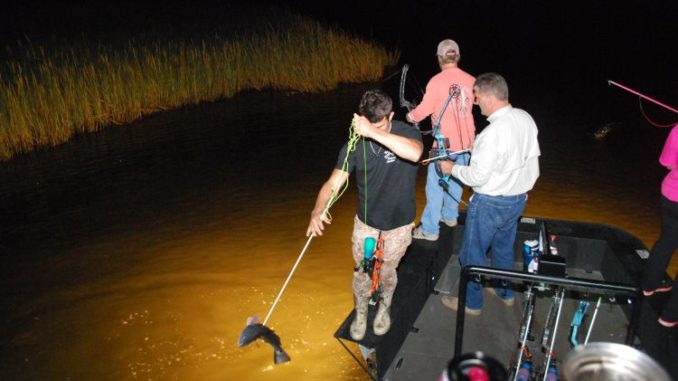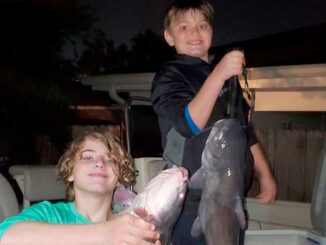
After the hunt, while floating quietly in the black night and enjoying a soda, I found out why David Lastrapes asked me before the hunt what I expected.
“Bowfishing has gotten a black eye,” the passionate bowfisherman said. “I’ve never brought anyone who didn’t want to come back. But I’ve been on a lot of offshore trips where people said they didn’t want to do it again. Plus you don’t get sunburned.”
“A lot of people who have never done it think it’s easy,” Capt. Graylin Schultheis added. “It is a lot more challenging than people think.”
Lastrapes said the biggest concern many anglers have is overblown.
“The black eye comes from people who have never done it,” he said. “The risk of shooting undersized fish is low. How many small trout have you released from a hook that you knew weren’t going to make it? Or red snappers that floated off, belly up.”
Roy Lally IV agreed.
“At least we can see them before we shoot,” he said.
And each hunt is carefully managed.
“There is no waste in what we do,” Schultheis explained. “We will eat that big bull drum that Lindsay shot. On a charter trip, I tell my customers not to shoot any more bull drum after two are in the boat. We tell every customer, ‘If you don’t want to eat it, don’t shoot it.’
“But even though our customers eat their fish, I think that the real reason people love bowfishing is that it’s a challenge.”
Lally seconded that.
“It adds the element of hunting to fishing,” he said.
Another of the bowfishermen added another attraction.
“This provides an adrenaline rush that rod and reel fishing doesn’t,” Chris Wilken said.
And Lastrapes said there’s another aspect he loves.
“This is also the most sociable of all sports,” Lastrapes said. “People talk about what we caught, not what I caught. People who don’t like it, have never done it.”
